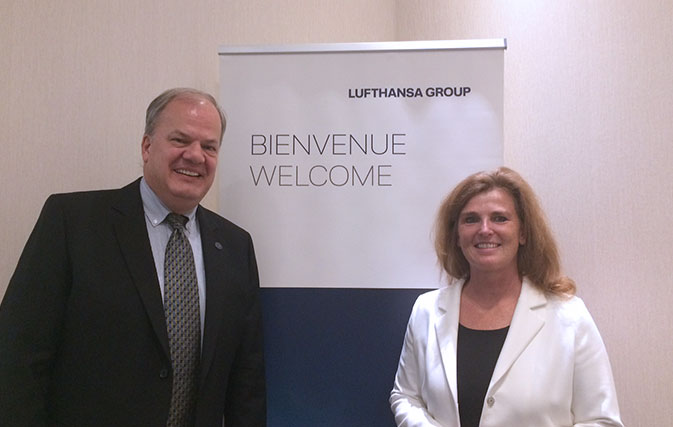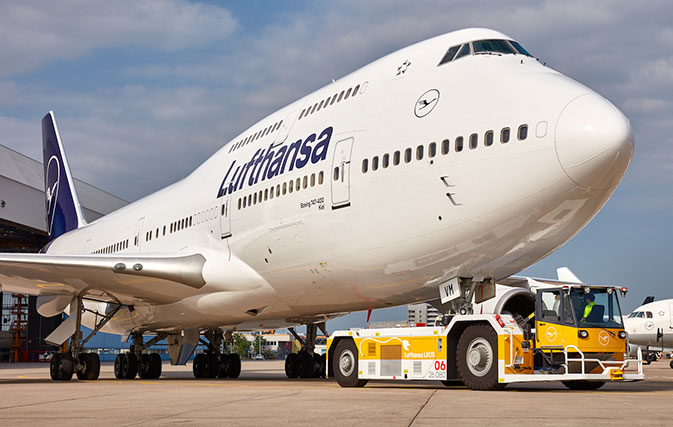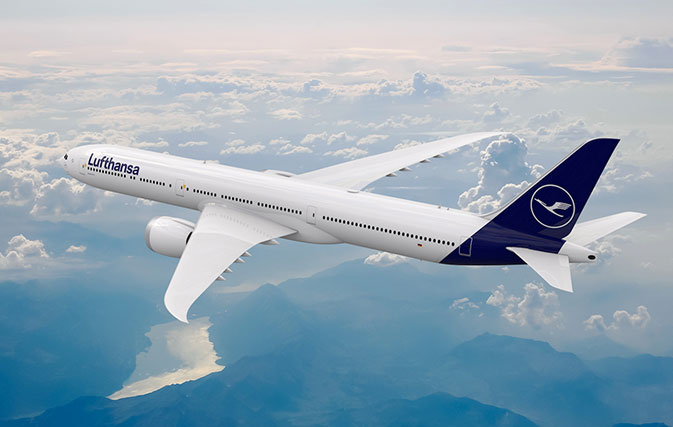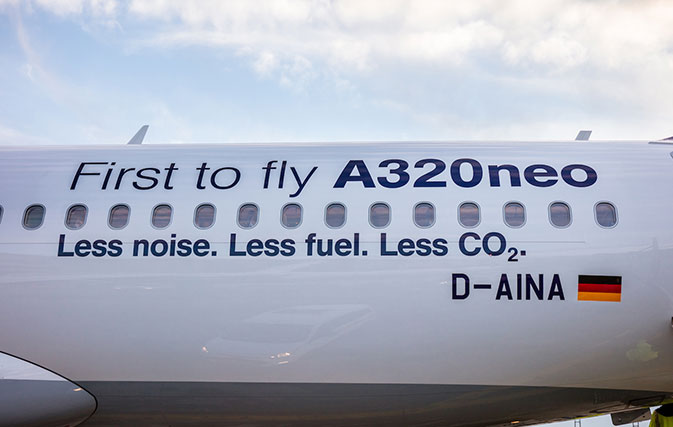TORONTO — Lufthansa Group is moving ahead with plans for increasingly customized seating and cabins in its new 777Xs, and at the same time rolling out a new continuous pricing model that will eventually see the elimination of traditional booking classes.
Heike Birlenbach, Senior Vice President Sales Lufthansa Hub Airlines Worldwide and CCO, joined Hans DeHaan, Senior Director, Canada in Toronto today for a far-reaching look at everything that’s new with the airline group.

Lufthansa’s Hans DeHaan, Senior Director, Canada and Heike Birlenbach, Senior Vice President Sales Lufthansa Hub Airlines Worldwide and Chief Commercial Officer
Lufthansa Group includes Austrian Airlines, Lufthansa, SWISS, Eurowings and Brussels Airlines.
The group’s continuous pricing model, in the works for some time, is now just about ready to roll out. Now in testing mode, continuous pricing will start to become available in early 2020, says Birlenbach.
“Booking classes will be eliminated over time,” she said. “With continuous pricing you will have endless price points.” This is possible with NDC, where Lufthansa Group has been a forerunner.
“Booking classes, they might not have a future.”
That’s not to say that cabin classes are disappearing. Far from it.
On one hand, Lufthansa Group, like many other international airline groups, is taking a hard look at its First Class. Many airlines are trimming down their First Class space or getting rid of it altogether, citing weak demand.
Says Birlenbach: “There is still demand for First Class but it is slowing down. Over the next few years we will decide what percentage of our fleet will have First Class.”
The upscale cabin still sells well in markets including China and Japan, and gateways like New York City and L.A. The Zurich-Montreal route still offers First Class but by and large Canada is not a First Class market, she says. Currently upwards of 60% Lufthansa’s fleet now has First Class cabins “and that will change over time.”
On the other hand, Lufthansa is making a massive investment – to the tune of $2.5 billion – in its fleet and customer experience over the next six years and that includes not just upgraded Business Class product but also a new class, Economy Plus. That’s not to be confused with Premium Economy.
Lufthansa has a lot in its pipeline right now, and passengers will be the beneficiaries, especially passengers flying on Lufthansa’s new B777X aircraft.
Birlenbach expects Lufthansa to begin taking delivery of its new 777Xs in early 2021. The original date, now delayed, was summer 2020.
The 777Xs will replace the 747s currently used out of Vancouver and Toronto, says DeHaan.
As reported last month, Lufthansa Group will increase its number of gateways in Canada, starting service from Ottawa to Frankfurt on May 16, 2020. With the new service Ottawa joins Lufthansa Group’s four existing Canadian gateways, including Toronto, Montreal, Vancouver and Calgary.
The seasonal Ottawa route, running until Oct. 24, 2020, will operate via A340-300 aircraft with a seat configuration of 30 Business Class seats, 28 Premium Economy Class Seats and 221 Economy Class seats.
The 777Xs, when they’re ready, will be the first showcase for all of Lufthansa Group’s innovations, including a state of the art Business Class experience with five to six different types of seating. Some Business Class seats will have no seats beside them, says Birlenbach. Others will have a bit of extra work space. “We did a lot of research with our customers, asking them ‘What is important when you fly?’” The new approach to seating is a reflection of that research, says Birlenbach.
Lufthansa is also working on a brand new Premium Economy cabin with shell seats, so passengers can lean back without disturbing passengers behind them. Premium Economy “has been very successful” for the group, and results-wise it’s the top performer for the group, says Birlenbach.
Economy Plus, meanwhile, “is basically Economy but with a bit more legroom.”
The First Class cabin, on the planes that offer it, will also be upgraded.
In a world where every consumer product is increasingly customized, “we have to be flexible.”
That extends to booking options as well. As agents well know, back in 2015 Lufthansa announced it would begin charging a 16 euro fee to every GDS booking. While travel agents could avoid the fee by booking at Lufthansa’s agent booking portal, at the time there was much speculation that the move could backfire for Lufthansa, with a 2015 poll of Global Business Travel Association (GBTA) Members showing 50% of travel managers with Lufthansa in their travel program as a preferred carrier planned to decrease spending with Lufthansa once the fee took effect.
The move wasn’t so much anti-agent as it was anti-GDS, although DeHaan notes that the GDSs are still very much partners for Lufthansa Group. Over the years other airlines followed suit with their own fees for GDS bookings, including British Airways and Iberia.
Levying a GDS booking fee “was quite a disruption,” says Birlenbach. “We wanted to have content freedom. We pay quite a lot per ticket through the GDSs and we believe it’s too much. That was a shake-up in the industry and we are proud we were the first ones. We would call it a success.”
Lufthansa’s Direct Connect booking option has seen good uptake in the trade, she adds.
Lufthansa is “100% committed to travel agents”, notes DeHaan, “especially in Canada.” Agents are still one of the biggest distribution channels for the group’s airlines. “A lot of our business still goes to travel agents,” says DeHaan. That’s despite the exponential growth in mobile bookings for the group, with voice bookings tapped as the next big thing. More and more households have Amazon’s Alexa and Google Home, and Lufthansa is collaborating with Google to work on voice-activated bookings.
“We believe the customer will choose the way they book our products and we need to make sure our products will be showcased wherever our customer is. And we want to make sure we’re in control of the offer,” says Birlenbach.
Lufthansa Group is also focused on reducing its carbon footprint. Fuel consumption with its new aircraft will be 20% lower, says Birlenbach. The group also fully supports the European Commission’s ‘Single European Sky’ initiative, which aims to streamline air travel in Europe.
Meanwhile the group is working more closely than ever with its Star Alliance partner Air Canada. The two have a joint venture agreement. “We jointly discuss with Air Canada how much capacity we put on the market,” says Birlenbach. “This is part of the joint venture’s success.”
Next up with Air Canada, Lufthansa Group is looking to harmonize recognition of the airlines’ top tier customers.
Lufthansa Group will offer up to 76 frequencies per week between its five gateways in Canada and its European hubs (Frankfurt, Munich, Vienna, Zurich and Brussels). All told some one million passengers fly routes between Canada and Europe annually with the group’s airlines.
“The Canadian market is of the utmost importance for us,” says Birlenbach. “We are connecting the Canadian market to the world.”



